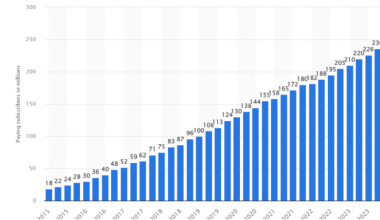The music industry is vast, constantly evolving, and heavily reliant on music distribution companies to get songs from creators to listeners. If you’ve ever wondered how your favorite artist’s music ends up on platforms like Spotify, Apple Music, or even in physical stores, you’re about to learn all about it. In this blog, we’ll dive deep into the largest music distribution companies, their role in the industry, and how they impact artists and listeners alike.
What Are Music Distribution Companies?
Before we explore the largest players in the game, let’s understand what music distribution companies actually do. In simple terms, these companies act as the middlemen between artists (or record labels) and platforms where people consume music. Whether it’s streaming services, digital downloads, or physical records, distribution companies ensure that the music reaches the intended audience.
They also handle licensing, royalties, and reporting to ensure that artists get paid for their work. With the rise of digital music, distribution has become more accessible but also more competitive. This has given rise to a few giants in the industry who dominate the market.
Why Music Distribution Matters
Imagine creating an incredible song but having no way to share it with the world. That’s where distribution comes in. These companies not only make sure that your music is available everywhere but also offer tools and resources to promote it effectively. In a world with millions of songs being released every year, visibility is everything.
Now, let’s explore the largest music distribution companies that are shaping the music industry today.
The Giants of Music Distribution
1. Universal Music Group (UMG)
Universal Music Group is often at the top of the list when discussing the largest music distribution companies. Headquartered in Santa Monica, California, UMG is a global leader with an extensive portfolio of artists, labels, and distribution networks.
Why It’s Huge:
- Represents top artists like Taylor Swift, Drake, and Billie Eilish.
- Operates in over 60 countries.
- Owns renowned labels such as Def Jam, Interscope, and Republic Records.
UMG doesn’t just distribute music—it’s a powerhouse of innovation, leveraging technology to expand its reach and optimize revenue streams for its artists.
2. Sony Music Entertainment
Another massive name in the music world, Sony Music Entertainment is based in New York City and operates globally. It’s part of the larger Sony Corporation and has a rich history in music distribution.
What Sets Sony Apart:
- Manages artists like Adele, Harry Styles, and Travis Scott.
- Owns major labels like Columbia Records and RCA Records.
- Strong focus on integrating technology and music, including investments in virtual reality and artificial intelligence.
Sony Music’s distribution network is unparalleled, ensuring that their artists’ music is available in every corner of the world.
3. Warner Music Group (WMG)
Warner Music Group completes the “Big Three”—the trio of companies that dominate the global music distribution landscape. Headquartered in New York, WMG operates in more than 50 countries.
Key Highlights:
- Features artists like Ed Sheeran, Lizzo, and Cardi B.
- Owns labels such as Atlantic Records and Warner Records.
- Invests heavily in emerging markets and independent artists.
Warner Music Group’s strategy includes acquiring smaller distribution companies to broaden its reach and adapt to changing market trends.
Independent Music Distribution Companies
While the Big Three dominate, independent music distribution companies are also making waves. These companies cater to artists who prefer to stay independent or don’t have access to major labels.
4. CD Baby
CD Baby is one of the most popular independent music distribution platforms. Founded in 1998, it has helped countless artists distribute their music to streaming platforms and physical stores.
Why Artists Love CD Baby:
- Easy-to-use platform.
- Affordable pricing.
- Artists retain 100% of their rights.
CD Baby has become a go-to option for independent musicians looking to take control of their careers.
5. TuneCore
Similar to CD Baby, TuneCore focuses on empowering independent artists. It’s known for its transparent pricing and wide distribution network.
Standout Features:
- Distributes to over 150 digital platforms.
- Offers marketing and promotional tools.
- Provides detailed royalty reports.
Many up-and-coming artists turn to TuneCore to launch their music careers without signing restrictive contracts.
6. DistroKid
DistroKid is another favorite among independent musicians, especially for its flat-fee pricing model.
What Makes DistroKid Unique:
- Unlimited song uploads for a single annual fee.
- Fast distribution—often within 24 hours.
- Tools for split payments among collaborators.
DistroKid’s focus on simplicity and affordability has made it a disruptor in the music distribution space.
The Rise of Digital-Only Distributors
As the music industry moves further into the digital realm, companies focusing exclusively on digital distribution are thriving. These companies often offer innovative tools and analytics to help artists grow their audience.
7. Believe Digital
Believe Digital is a major player in digital music distribution, working with both independent artists and labels.
Why Believe Stands Out:
- Focuses on data-driven decision-making.
- Offers marketing services tailored to digital platforms.
- Works in over 50 countries.
8. AWAL (Artists Without A Label)
AWAL, owned by Sony Music, is a digital distributor catering to artists who want to maintain creative control.
Key Benefits:
- Transparent revenue sharing.
- Access to detailed streaming analytics.
- Support for marketing and promotion.
AWAL has been instrumental in helping independent artists break into the mainstream.
Conclusion
The largest music distribution companies, whether they are part of the Big Three or independent platforms, play a crucial role in connecting artists with audiences. From Universal Music Group to DistroKid, these companies offer diverse options for artists at every stage of their careers. Whether you’re an aspiring musician or a music enthusiast, understanding how these companies operate can give you a new appreciation for the industry.
For further reading, explore these related articles:
For additional resources on music marketing and distribution, visit DMT Records Private Limited.






